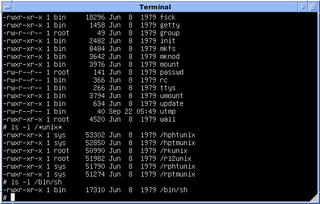
Bash, short for Bourne-Again SHell, is a shell program and command language supported by the Free Software Foundation and first developed for the GNU Project by Brian Fox. Designed as a 100% free software alternative for the Bourne shell, it was initially released in 1989. Its moniker is a play on words, referencing both its predecessor, the Bourne shell, and the concept of renewal.

A shell script is a computer program designed to be run by a Unix shell, a command-line interpreter. The various dialects of shell scripts are considered to be scripting languages. Typical operations performed by shell scripts include file manipulation, program execution, and printing text. A script which sets up the environment, runs the program, and does any necessary cleanup or logging, is called a wrapper.

A Unix shell is a command-line interpreter or shell that provides a command line user interface for Unix-like operating systems. The shell is both an interactive command language and a scripting language, and is used by the operating system to control the execution of the system using shell scripts.

The Bourne shell (sh) is a shell command-line interpreter for computer operating systems.

The C shell is a Unix shell created by Bill Joy while he was a graduate student at University of California, Berkeley in the late 1970s. It has been widely distributed, beginning with the 2BSD release of the Berkeley Software Distribution (BSD) which Joy first distributed in 1978. Other early contributors to the ideas or the code were Michael Ubell, Eric Allman, Mike O'Brien and Jim Kulp.
Almquist shell is a lightweight Unix shell originally written by Kenneth Almquist in the late 1980s. Initially a clone of the System V.4 variant of the Bourne shell, it replaced the original Bourne shell in the BSD versions of Unix released in the early 1990s.
printf is a C standard library function that formats text and writes it to standard output.
xargs is a command on Unix and most Unix-like operating systems used to build and execute commands from standard input. It converts input from standard input into arguments to a command.

In most Unix and Unix-like operating systems, the ps program displays the currently-running processes. The related Unix utility top provides a real-time view of the running processes.
In computing, echo is a command that outputs the strings that are passed to it as arguments. It is a command available in various operating system shells and typically used in shell scripts and batch files to output status text to the screen or a computer file, or as a source part of a pipeline.

A command shell is a command-line interface to interact with and manipulate a computer's operating system.
test is a command-line utility found in Unix, Plan 9, and Unix-like operating systems that evaluates conditional expressions. test was turned into a shell builtin command in 1981 with UNIX System III and at the same time made available under the alternate name [.
In computing, a shebang is the character sequence consisting of the characters number sign and exclamation mark at the beginning of a script. It is also called sharp-exclamation, sha-bang, hashbang, pound-bang, or hash-pling.
sum is a legacy utility available on some Unix and Unix-like operating systems. This utility outputs a 16-bit checksum of each argument file, as well as the number of blocks they take on disk. Two different checksum algorithms are in use. POSIX abandoned sum in favor of cksum.
Qshell is an optional command-line interpreter (shell) for the IBM i operating system. Qshell is based on POSIX and X/Open standards. It is a Bourne-like shell that also includes features of KornShell. The utilities are external programs that provide additional functions. The development team of Qshell had to deal with platform-specific issues such as translating between ASCII and EBCDIC. The shell supports interactive mode as well as batch processing and can run shell scripts from Unix-like operating systems with few or no modifications.
In computer programming, a usage message or help message is a brief message displayed by a program that utilizes a command-line interface for execution. This message usually consists of the correct command line usage for the program and includes a list of the correct command-line arguments or options acceptable to said program.
In a Unix shell, the full stop called the dot command (.) is a command that evaluates commands in a computer file in the current execution context. In the C shell, a similar functionality is provided as the source command, and this name is seen in "extended" POSIX shells as well.
Getopt is a C library function used to parse command-line options of the Unix/POSIX style. It is a part of the POSIX specification, and is universal to Unix-like systems. It is also the name of a Unix program for parsing command line arguments in shell scripts.
Different command-line argument parsing methods are used by different programming languages to parse command-line arguments.

A command-line interface (CLI) is a means of interacting with a computer program by inputting lines of text called command-lines. Command-line interfaces emerged in the mid-1960s, on computer terminals, as an interactive and more user-friendly alternative to the non-interactive interface available with punched cards.





